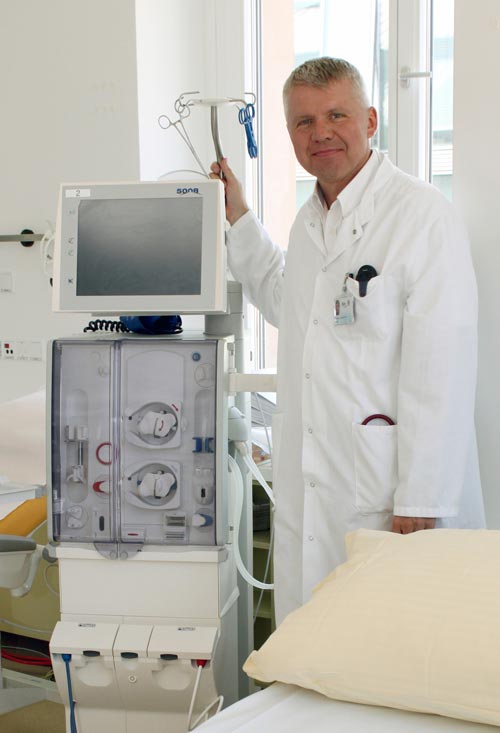Computer model aimed at optimising treatment of diabetic kidney diseases

Projektkoordinator und Direktor der Innsbrucker Univ.-Klinik für Innere Medizin IV, Gert Mayer (mit einem Dialysegerät). Foto: MUI
An international consortium has started the R&D project “DC-Ren: Drug combinations for rewriting trajectories of renal pathologies in type II diabetes’.
Aimed at developing systematic approaches in order to discover improved combination of drug treatment for complex diseases, the international research initiative ranked on top of 50 other applicants to secure the EUR 6m in funding.
The R&D project is headed by Gert Mayer, Director of the University Hospital for Internal Medicine IV (Nephrology and Hypertension) at the Medical University of Innsbruck. The goal is to develop a data-based support tool for decision-making with a view to optimising personalised therapies.
The university will be working with teams from Austria (emergentec biodevelopment GmbH, and a working group led by Rainer Oberbauer, head of the Division of Nephrology and Dialysis at the Medical University of Vienna /Vienna General Hospital), Denmark, Germany, Israel, Italy and the Netherlands.
Mathematical model for predicting disease trajectory
“Diabetic kidney diseases are the main cause of kidney failure in industrialised countries,” says Innsbruck-based nephrologist and project coordinator Gert Mayer. “Although we have seen a significant improvement in the range of treatment options available, it is still not possible to fully predict their effectiveness in individuals.”
A mathematical model is intended to generate predictions on disease trajectories and responses to treatment, which in turn will help to improve the precision of personalised combined medications. “The scientific approach is based on an innovative new patient assessment concept in the form of a hybrid AI solution developed by one of the project partners, Vienna-based technology company emergentec biodevelopment GmbH,” Mayer explains.
Key biobanks and clinical data will be used in combination with experimental, analytical and statistical evaluations in order to develop a prototype technology solution, which will then be validated in clinical settings. Mayer sees huge potential in the model: “Besides assessing new health technologies and the possibilities they open up, the aims of the DC-ren project are clearly a move towards enhancing precision medicine as a means of treating complex diseases.”
“As in our two previous EU projects on this subject, we will use innovative approaches to further improve the effectiveness of treatments for diabetic kidney disease,” added Rainer Oberbauer of MedUni Vienna.
Diabetic kidney disease more prevalent
Around 50 million people in Europe, or 10% of the population, suffer from chronic kidney conditions. Meanwhile, about 40% of diabetics suffer kidney damage as a result of the disease. The steady increase in the prevalence of hypertension and diabetes in Europe means that kidney, heart and vascular diseases are also becoming more widespread.
Early recognition and prevention are playing a central role in treatment, and are also becoming a major focus in nephrology research. If the disease is diagnosed at any early stage and its trajectory can be forecast accurately, targeted treatment can be administered, removing the need for dialysis or a kidney transplant, which become necessary in the later stages of the condition.
According to Gert Mayer: “Renal insufficiency not only restricts the functioning of the kidneys, it also affects the cardiovascular system and bone metabolism – the consequence is an increased risk of heart attack and osteoporosis.”
Further information: www.dc-ren.eu
Project partners:
Austria:
Medical University Innsbruck (Lead: Gert Mayer)
Medical University Vienna (Lead: Rainer Oberbauer)
emergentec biodevelopment GmbH Vienna (Lead: Bernd Mayer)
Germany: Mosaiques Diagnostics GmbH Hannover (Lead: Harald Mischak)
The Netherlands: Academisch Ziekenhuis Groningen (Lead: Hiddo J Lambers Heerspink)
Denmark: Region Hovedstaten Hillerod (Lead: Peter Rossing)
Israel: Weizmann Institute of Science Rehovot (Lead: Doron Lancet)
Italy: European Centre for Living Technology, University Ca`Foscari Venezia (Lead: Irene Poli)
Univ.-Prof. Dr. Gert Mayer
Medical University of Innsbruck
University Hospital of Internal Medicine IV
Anichstraße 35, 6020 Innsbruck, Austria
Tel. +43 (0)512 504-25856
gert.mayer@i-med.ac.at, www.i-med.ac.at
https://www.i-med.ac.at/pr/presse/2020/24.html [Photos for download]
Media Contact
All latest news from the category: Medical Engineering
The development of medical equipment, products and technical procedures is characterized by high research and development costs in a variety of fields related to the study of human medicine.
innovations-report provides informative and stimulating reports and articles on topics ranging from imaging processes, cell and tissue techniques, optical techniques, implants, orthopedic aids, clinical and medical office equipment, dialysis systems and x-ray/radiation monitoring devices to endoscopy, ultrasound, surgical techniques, and dental materials.
Newest articles

Properties of new materials for microchips
… can now be measured well. Reseachers of Delft University of Technology demonstrated measuring performance properties of ultrathin silicon membranes. Making ever smaller and more powerful chips requires new ultrathin…

Floating solar’s potential
… to support sustainable development by addressing climate, water, and energy goals holistically. A new study published this week in Nature Energy raises the potential for floating solar photovoltaics (FPV)…

Skyrmions move at record speeds
… a step towards the computing of the future. An international research team led by scientists from the CNRS1 has discovered that the magnetic nanobubbles2 known as skyrmions can be…





















